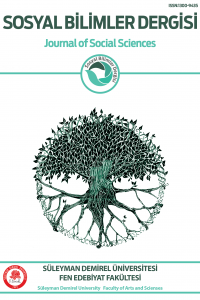Hatırlamanın Pratiği, Kutlamanın Politikası: 1970'li yıllarda Türkiye'de Aile/Sevgili Temalı Posta Kartlarında Mutluluk Temsilleri ve Kutlama Mesajları
Öz
Posta kartları; sanat, fotoğraf, baskı tekniği ve turizm tarihlerinin bir parçası, üzerindeki görselle bağlantılı olarak da belirli bir ikonografik geleneğe işaret eden çok anlamlı bir maddi kültür nesnesidir. Bu bağlamda posta kartları, modernleşme, sömürgecilik, propaganda tarihi ve toplumsal cinsiyet ilişkilerine dair okumaların da odağı olmuştur. Bu çalışmada ise 1970’li yıllarda yoğun bir biçimde dolaşımda olan aile/sevgili temalı posta kartlarının, biri bir diğerinin içinden geçen farklı boyutları ele alınıyor. Bu kapsamda önce, kartpostalların bir kutlama nesnesi olarak kullanılmasından dolayı kutlamanın ritüelleştirme yönü konu ediliyor. Sonrasında, bir mücadele alanı olarak yeniden tanımlanan “ritüelleştirme” kavramından hareketle kartpostalların görsellerindeki “temsil pratikleri” inceleniyor. Diğer bir yandan posta kartlarının, arkasına yazılan “kutlamanın kalıp sözleri” üzerinden de poetikası tartışmaya açılıyor. Sonuç olarak bu çalışmada, kartpostalların bir hatırlama ve kutlama pratiği olması bağlamında bir maddi kültür nesnesi olarak kendisinin ne anlattığına, yorumsamacı bir perspektiften kulak veriliyor.
Anahtar Kelimeler
Kaynakça
- ABÉLÈS, Marc (2012) Devletin Antropolojisi, Çev. Nazlı Ökten, Ankara: Dipnot Yayınları.
- ADAMS, Caroline Joy (2004) An Italic Calligraphy Handbook, New York: Dover Publications.
- ANDERSON, Benedict (1993) Hayali Cemaatler: Milliyetçiliğin Kökenleri ve Yayılması, Çev. İskender Savaşır, İstanbul: Metis Yayınları.
- APPADURAI, Arjun (1986) "Introduction: Commodities and the Politics of Value", The Social Life of Things: Commodities in Cultural Perspective, NewYork: Cambridge University Press, 3-64.
- AUSTIN, John Langshaw (2009) Söylemek ve Yapmak, Çev. R. Levent Aysever, İstanbul: Metis Yayınları.
- BELL, Catherine (1992) Ritual Theory, Ritual Practice, Oxford: Oxford University Press.
- CLASTRES, Pierre (2006) Devlete Karşı Toplum, Çev. Mehmet Sert & Nedim Demirtaş, İstanbul: Ayrıntı Yayınları
- FAIRBANK, Alfred (1951) Italic Handwriting, Journal of the Royal Society of Arts, Vol.99, pp. 884-895.
- FOUCAULT, Michel (2016) Özne ve İktidar, Çev. Işık Ergüden & Osman Akınhay, İstanbul: Ayrıntı Yayınları.
- GEERTZ, Clifford (2010) Kültürlerin Yorumlanması, Çev. Hakan Gür, Ankara: Dost Kitabevi Yayınları.
- GLASSIE, Henri (1999) Material Culture, Bloomington and Indianapolis: Indiana University Press.
- HALL, Stuart (2017) Temsil: Kültürel Temsiller ve Anlamlandırma Uygulamaları, Çev. İdil Dündar, İstanbul: Pinhan Yayıncılık.
- HARRIS, David (1995) Art of Calligraphy, London: DK.
- JAMES, Wendy (2013) Törensel Hayvan: Yeni Bir Antropoloji Portresi, Çev. Sevda Çalışkan, İstanbul: İş Bankası Yayınları.
- Kâşgarlı Mahmud (1986) Divan-ı Lügat-it- Türk, Çev. Besim Atalay, Ankara: Türk Tarih Kurumu Yayınları.
- KOÇ, Turan (1998) Din Dili, İstanbul: İz Yayıncılık. LEWIS, Gilbert (1980) Day of Shining Red: An Essay on Understanding Ritual, Cambridge: Cambridge University Press.
- RICOEUR, Paul (2011) Hafıza, Tarih, Unutuş, Çev. M. Emin Özcan, İstanbul: Metis Yayınları.
- SANCAR, Serpil (2014) Türk Modernleşmesinin Cinsiyeti, İstanbul: İletişim Yayınları.
- WEBER, Max (2018) Ekonomi ve Toplum I, İstanbul: Yarın Yayıncılık.
The Practice of Remembering, Politics of Celebration: Representations of Happiness and Greeting Messages on Family/Lover Themed Postcards of the 1970s in Turkey
Öz
Postcards are both a part of the history of art, photography, printing technique and tourism, and polysemic material culture objects which point to a particular iconographic tradition as connected with the visual they bear. Within this context, postcards have been the focus of readings on modernization, colonialism, propaganda history and gender relations as well. In this study, family/lover themed postcards which have been in circulation intensely in the 1970s are approached from different aspects that pass through one another. Within this scope, the ritualization aspect of the celebration is discussed first since postcards are used as greeting objects. Then, with reference to the concept of "ritualization" which is redefined as an area of conflict, "representation practices" in the visuals of postcards are investigated. On the other hand, the poetics of postcards are also brought into question by the "formulaic expressions of the greeting" written on their backs. Eventually in this study, in the context of postcards being a practice of remembering and celebrating, they are listened from an interpretive perspective for what they represent on their own as material culture objects.
Anahtar Kelimeler
Kaynakça
- ABÉLÈS, Marc (2012) Devletin Antropolojisi, Çev. Nazlı Ökten, Ankara: Dipnot Yayınları.
- ADAMS, Caroline Joy (2004) An Italic Calligraphy Handbook, New York: Dover Publications.
- ANDERSON, Benedict (1993) Hayali Cemaatler: Milliyetçiliğin Kökenleri ve Yayılması, Çev. İskender Savaşır, İstanbul: Metis Yayınları.
- APPADURAI, Arjun (1986) "Introduction: Commodities and the Politics of Value", The Social Life of Things: Commodities in Cultural Perspective, NewYork: Cambridge University Press, 3-64.
- AUSTIN, John Langshaw (2009) Söylemek ve Yapmak, Çev. R. Levent Aysever, İstanbul: Metis Yayınları.
- BELL, Catherine (1992) Ritual Theory, Ritual Practice, Oxford: Oxford University Press.
- CLASTRES, Pierre (2006) Devlete Karşı Toplum, Çev. Mehmet Sert & Nedim Demirtaş, İstanbul: Ayrıntı Yayınları
- FAIRBANK, Alfred (1951) Italic Handwriting, Journal of the Royal Society of Arts, Vol.99, pp. 884-895.
- FOUCAULT, Michel (2016) Özne ve İktidar, Çev. Işık Ergüden & Osman Akınhay, İstanbul: Ayrıntı Yayınları.
- GEERTZ, Clifford (2010) Kültürlerin Yorumlanması, Çev. Hakan Gür, Ankara: Dost Kitabevi Yayınları.
- GLASSIE, Henri (1999) Material Culture, Bloomington and Indianapolis: Indiana University Press.
- HALL, Stuart (2017) Temsil: Kültürel Temsiller ve Anlamlandırma Uygulamaları, Çev. İdil Dündar, İstanbul: Pinhan Yayıncılık.
- HARRIS, David (1995) Art of Calligraphy, London: DK.
- JAMES, Wendy (2013) Törensel Hayvan: Yeni Bir Antropoloji Portresi, Çev. Sevda Çalışkan, İstanbul: İş Bankası Yayınları.
- Kâşgarlı Mahmud (1986) Divan-ı Lügat-it- Türk, Çev. Besim Atalay, Ankara: Türk Tarih Kurumu Yayınları.
- KOÇ, Turan (1998) Din Dili, İstanbul: İz Yayıncılık. LEWIS, Gilbert (1980) Day of Shining Red: An Essay on Understanding Ritual, Cambridge: Cambridge University Press.
- RICOEUR, Paul (2011) Hafıza, Tarih, Unutuş, Çev. M. Emin Özcan, İstanbul: Metis Yayınları.
- SANCAR, Serpil (2014) Türk Modernleşmesinin Cinsiyeti, İstanbul: İletişim Yayınları.
- WEBER, Max (2018) Ekonomi ve Toplum I, İstanbul: Yarın Yayıncılık.
Ayrıntılar
| Birincil Dil | Türkçe |
|---|---|
| Bölüm | Sosyoloji |
| Yazarlar | |
| Yayımlanma Tarihi | 31 Ağustos 2020 |
| Yayımlandığı Sayı | Yıl 2020 Sayı: 50 |
Kaynak Göster
Süleyman Demirel Üniversitesi Fen-Edebiyat Fakültesi Sosyal Bilimler Dergisi


